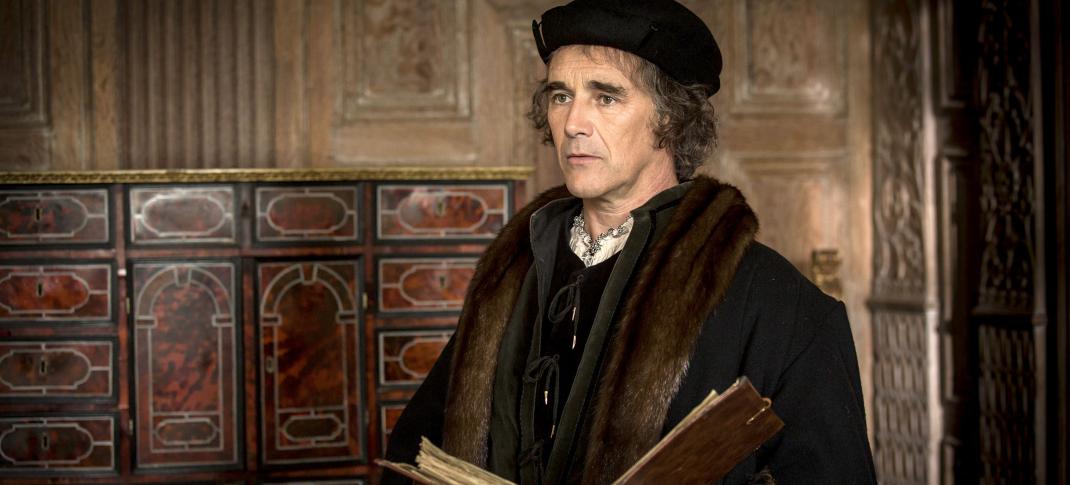'Wolf Hall's "The Devil's Spit" Is the Anti-'Man for All Seasons'

Mark Rylance as Thomas Cromwell in a remarkable shot that imitates a painting of the real man in 'Wolf Hall' Season 1
Ed Miller/Playground & Company Pictures for Masterpiece/BBC
In one of the most remarkable episodes of Wolf Hall's first season, Hillary Mantel takes the plot of the famous Oscar-winning film A Man For All Seasons and argues that actually, Thomas More was a self-centered fool. Meanwhile, Anne may have nurtured her way to be queen, but nature is refusing to cooperate.
Cromwell: Holy simplicity was all very well in its day, but its day is over.
Henry VIII's parade of six wives in a decade has been mined for drama almost since his life ended. There have been countless retellings about the King who turned an entire country and its religious practices on its ear so that he could legally divorce, remarry, and sire a male heir. (That he then proceeded to divorce, behead, or be outlived by four women in succession was just gravy.) From silly vaudeville songs to sexy late-night dramas to hit musicals, everyone wanted to dig into Henry's story; even Shakespeare wrote about it.
*(Notably, Shakespeare waited until after the death of his patron, Elizabeth I, who as we are reminded this week, is the daughter of said monarch and Anne Boleyn. Trying to put it on stage during her reign would have been the 16th-century version of "too soon").
Before Wolf Hall, the last artistic work of "serious scholarship" was the 1954 stage play A Man for All Seasons, initially written for BBC radio, and then turned into a film adaptation in 1966 starring Paul Scofield and Orson Wells. For those who have not read or seen it, the story covers almost the same time period as this series, covering the same events, except instead of Cromwell, it is from the perspective of Sir Thomas More: Religious hero, pious soul, and so faithful to God in all seasons that he was willing to be executed rather than bend to the will of the King.
Since the film is a British National Treasure, there was always the foreknowledge that some critics would inevitably compare the two. Wolf Hall has taken the opposite viewpoint to the one espoused by A Man for All Seasons, in which Cromwell is cast as an evil, un-pious man working to bring down god's faithful servant. However, scriptwriter Peter Straughan seems to be glancing over their shoulders as the execution of More arrives. His More, "God's faithful servant," is so pious as to strike terror in men's hearts, so committed to the word of God he would be executed, and a man who would happily sit and torture "heretics" while droning on in Latin.
It speaks volumes of how much we have changed as a society since the 1960s; that we now see the evil of refusing to bend in what was once a celebration of the holiness of religion, asking us to hold a man who would commit suicide by King up as a moral standard. Instead, we celebrate the areligious figure in Cromwell, who gives speeches on how the real power in the world is money, and woe be to those who forget that.
(I remember seeing A Man for All Seasons as a teenager in the '90s and thinking to myself that he was hella selfish since his wife and children would be left destitute and displaced once he died, which in this day and age is known as "problematic.")
While More is sacrificing himself all noble-like in the Tower of London, Anne Boleyn (and Cromwell) discover women can only hustle their way up the ladder of success so far in 1533. One can remove religious hysterics cloaking sexism within dire pronouncements; Cromwell does as much to Elizabeth Barton, "The Holy Maid," and the powerful families that find women like Barton beneficial to their cause.
One can even push for More's head, as Anne does post-miscarriage, blaming his holy nonsense as part of why she cannot conceive properly, and sealing his fate. (Though, to be fair, More already sealed it himself, almost joyfully, knowing his name will be held aloft as a martyr for centuries to come.) But, when one's stature — and very life — depend on something as dangerous as childbirth, nature and luck also dictate the winning side.
Right now, neither seems to be on the side of Anne, who, over the space of More's final days, gives birth to a baby of the wrong sex and then miscarries another. Standing there in the morning light, bleeding out her child, and surrounded by sharks like Lady Rochford, Anne looks very vulnerable indeed. Next week, time will desert Anne, too, along with nature and luck.
As for Cromwell, he has seen More beheaded and survived a fever. Now seeing himself at the apex of his power, he decides it's time to have Henry's Royal Traveling Band stop off at Jane Seymour's homestead, Wolf Hall, so he can reconsider asking for her hand. But by the time they're done, perhaps Cromwell will have wished he had just taken the vacation days and paid his way to Wolf Hall instead of using the king's itinerary for his own ends.
This post was originally published April 2015. Updated 11.17.2024
The original 2015 Wolf Hall will continue on Sundays at 10 p.m. ET on most local PBS stations and the PBS app. All six episodes are available to stream on the PBS Masterpiece Prime Video Channel and for members of PBS Passport. Wolf Hall: The Mirror & The Light will debut in 2025.







